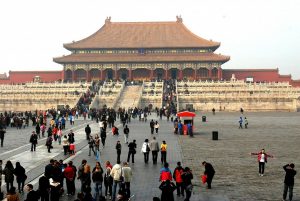Deep within U.S. President Donald Trump’s executive order last week, which declared Hong Kong no longer sufficiently autonomous to justify differential treatment, stood a clause outlining steps to terminate the United States’ Fulbright exchange program in China and Hong Kong. With this announcement comes the closure of yet another vehicle for people-to-people exchange between the two countries, after the January axing of the Peace Corps program in China.
First founded in 1946 to support the “promotion of international good will through the exchange of students in the fields of education, culture, and science,” the Fulbright Program has had more than 390,000 U.S. participants and operated in more than 160 countries. Several dozen American and Chinese scholars and students participated in its earlier years in China under the Nationalist government, before the establishment of the People’s Republic of China in October 1949. Though suspended for 30 years, the Fulbright Program in mainland China resumed following the normalization of diplomatic relations in 1979 and later expanded in 1983 to include research and education opportunities across a wide array of academic fields, from science and technology to history, literature, law, journalism, business, economics, political science, sociology, philosophy, and international relations. Since, Fulbright has provided varied opportunities for academic exchange for foreign nationals in the United States (as students, visiting researchers, Chinese Foreign Language Teaching assistants, or on Ph.D. dissertation research programs) and for U.S. citizens in China (via lecture, research, or student programs).
During the 2004-2005 academic year, there were 61 grants for foreign nationals from China and Hong Kong and another 75 grants to U.S. citizens studying in those areas. Comparatively, in 2016-2017 (the last year with publicly available data), 128 Chinese and Hong Kongers received grants to the United States, with 66 U.S. citizen awardees. Over the last 40 years, more than 3,000 Americans and Chinese have participated in the U.S.-China Fulbright Programs. Programs like Fulbright fit alongside larger public policy and diplomatic initiatives that promote people-to-people interactions (for example, the 100,000 Strong campaign, launched in 2011, to increase and diversify study abroad experiences in China). Although the number of grantees in the mainland China and Hong Kong programs may represent a small share of the full scope of Fulbright fellowships, the impact of such exchanges are often overlooked, perhaps because the effects are by and large intangible.
Last week’s decision to shut down the program in China elicited strong reactions from the China-watching and academic communities, ranging from frustration to outrage. Some condemned the move as idiotic. Others, including alums of the program, decried the loss of a valuable channel for cultural exchange and experience. Cecilia Han Springer, a post-doctoral researcher at Harvard University’s Belfer Center, tweeted “People-to-people exchange is the foundation of high-level foreign policy. Without understanding – the opportunity to experience each other’s cultures – there is little hope for progress.” Margaret Lewis, a professor of law at Seton Hall University, described the decision to shutter the program as “shooting ourselves in the foot” and cautioned it would “create walls,” impeding cross-cultural understanding. Scott Kennedy of the Center for Strategic and International Studies (CSIS) also highlighted the importance of the program to help Americans better understand China, noting that such an endeavor is “critical whether the PRC is friend or foe.” Alums of the Fulbright program also launched a petition in opposition to its closure, which garnered more than 740 signatories within two days
The thrust of the Fulbright program’s mission is perhaps best embodied in remarks by its namesake, Senator J. William Fulbright, at its 30th anniversary in 1976: “International educational exchange is the most significant current project designed to continue the process of humanizing mankind to the point, we would hope, that men can learn to live in peace — eventually even to cooperate in constructive activities rather than compete in a mindless contest of mutual destruction…We must try to expand the boundaries of human wisdom, empathy and perception, and there is no way of doing that except through education.”
The latest move by the White House seems to confirm a transactional view toward U.S.-China relations, in which the Trump administration is willing to sacrifice a source of long-term relationship and knowledge building in a bid to punish current Chinese behavior. Such shortsightedness, however, is likely to damage bilateral ties further down the road by politicizing nuanced vehicles of exchange between China and the United States.

































